Christina Baehr on life as a mother-of-ten and becoming a best-selling author
Christina Baehr runs an off-grid hostel in the Huon Valley while raising (and homeschooling) her huge family. She’s not famous, and she’s not rich, but in her first year of publishing she doubled her household income.

Among the green hills of Tasmania’s Huon Valley lies the Pilgrim Hill hostel run by Christina Baehr and her husband Peirce. The couple live here surrounded by bushland with their ten children aged between 16 months and 16 years. Their home on the 26-acre off-grid property is warm, cosy and as chaotic as you might expect. Little arrangements of wildflowers in pots are dotted around the place, alongside well-worn toys and paperback novels with vintage-style covers. So far, so very “cottage-core”, as Christina freely admits. While we speak, the comings and goings of children seems relentless, but she is remarkably good at dropping a train of thought – to answer a child’s question, or comfort them, or solve a problem – then picking it up again.
Between operating the Christian-led hostel, crop-swaps and homeschooling the older kids, you’d be forgiven for thinking we were in “trad wife” territory (the trend where women revert to traditional roles in the home, often with an accompanying Instagram account to showcase their artisanal lifestyles). But one day a week, Christina steps away from these duties and retires to a beautified shipping container to write. Here, she indulges her brimming imagination. The kids, true to their word, give her the space she needs on her “writing day”, bothering her only to deliver a regular flow of energy-sustaining tea and biscuits. “They bring me treats,” she says. “It’s very sweet.”
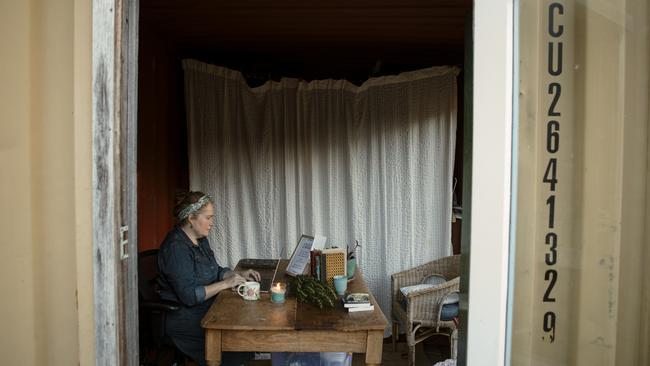
What Christina Baehr has managed to achieve, from her little wooden desk in that reclaimed shipping container, one day a week, is quite a feat. In just over a year she has published five fantasy novels, selling almost 40,000 copies. A rare success in the world of online self-publishing, she has secured an agent in London and sold the rights to at least one translation deal.
Having a family the size of the Baehrs’ seems incongruent with modern life – indeed, last year the Australian Institute of Family Studies reported that in 2023 the total fertility rate had fallen to 1.5, the lowest ever recorded. The 21st-century trend has indisputably been towards smaller family sizes, driven by financial and housing pressures, as well as women entering the workforce in greater numbers and delaying the start to a family of their own. Why have the Baehrs, a Christian family, bucked the trend? It’s not really a religious thing, Christina insists. “I was an only child. My parents struggled with infertility and were told they couldn’t have kids, and then I came along, so I was kind of a miracle baby,” she says. “I grew up very much with that in my mind – that children were something you wanted. I definitely grew up thinking a big family would be a great thing to have. My best friend growing up was the oldest of 10, and they just seemed like they were on a big adventure.”
As a young woman, she was adamant that she wanted 10 kids, and was very open about it – too open, in the opinion of her friends. When she kept repeating it in her twenties, they would tell her, “Christina, nobody will date you, stop saying that!”
Meanwhile, Peirce, who grew up in the US with three siblings, was about 12 when he read the 1940s memoir Cheaper by the Dozen by Frank Bunker Gilbreth Jr. and Ernestine Gilbreth Carey, and “just completely fell in love with the idea of having a giant family”. His friends didn’t fancy his chances of meeting a woman who would feel the same, so when he was getting to know Christina, and he asked her, “How many kids would you like?” and she replied, “I want 10”, he could hardly believe it.
Christina remembers once hearing the parents of a large family explain their decision by saying, “We were having such a great time at the party, we just wanted to invite more people,” and says that resonates with her as well: “We’re having fun. One of the positives is being able to watch the kids develop relationships among themselves, and be there for each other; they also learn to be more tolerant to different personality types... my kids now are much more aware of neurodivergence and invisible disabilities, because we have those things represented in our family.”
The couple plan to stop at 10 because they want to be “emotionally and physically present” for their children, she adds. “Parenting isn’t just about getting kids to a certain age. It’s about being emotionally available to them even in adulthood. There’s a cumulative wear and tear on the body and then the soul [with 10 kids].”
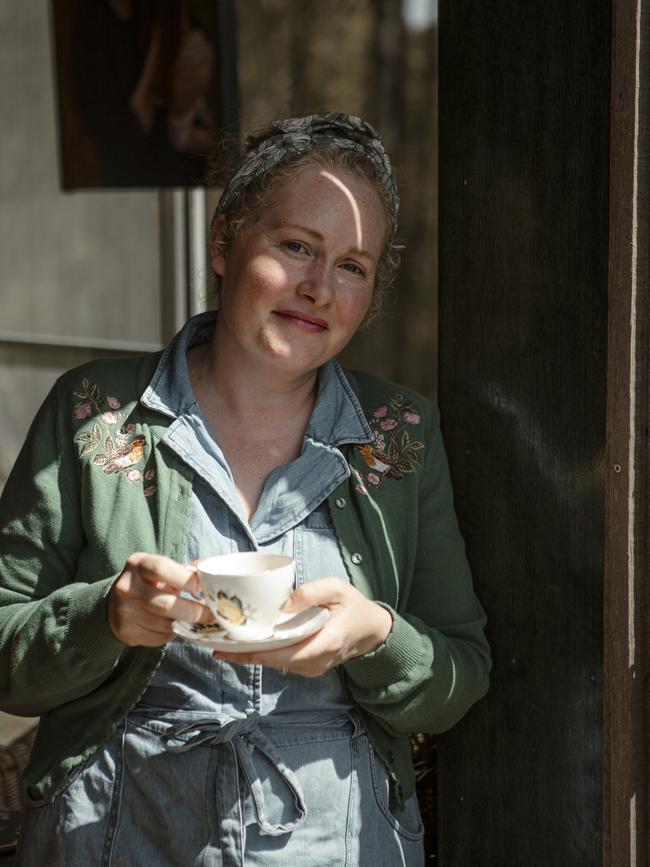
In many ways motherhood, while making significant demands on her time, has been the catalyst for what came next for Christina, who seems able to be busy without being stressed, and never too busy to appreciate the funny side of a situation or a story. When she speaks, she frequently interrupts herself with laughter. She’s used to “having a lot of pots on the boil, having a lot of story threads”, and being attentive to human beings “in all of their diversity and vagaries”. It’s motherhood that fine-tuned her focus and efficiency, directing her to become a self-made, best-selling, independent author.
So, where did she find the time to do it? How did she not only start a book, but a series, which she has since finished, published, and sold? She tells me she didn’t start writing because she had the time. She started because she had an idea.
It came to her at the end of 2022, during a year she described as the worst of her life. Peirce’s mother was dying of cancer and the family braved multiple flights, during a pandemic, to see her one last time. It was the year they caught a strain of Covid that for their eldest daughter would become Long Covid, and the year another daughter had to undergo life-saving heart surgery. And then Peirce and their nine kids fell sick with a nasty stomach bug. While nursing her family through the illness, Christina had her idea for a story. Set in another country, and another century, in a world where dragons, though rare, were real.
By day, Christina tended to her family’s needs and turned the ideas over in her head. At night, her body was exhausted but her imagination was on fire. As she nursed their youngest child, and her husband and other children slept, she reached for her phone and, with two thumbs flying frantically, began to type, bashing the words out into her Notes app.
“Everyone would fall asleep in the house, finally, and my brain would just be like a lightbulb,” she recalls. “ You know, like in a cartoon or a comic. That was me every night when everyone fell asleep. And it was funny because I would have that feeling like, ‘I want to know what happens next!’ But I had to write it!”
Writing was a kind of escape, and a kind of therapy; it stimulated her intellect and her imagination. Also, it was fun. Before long she had turned out a 45,000-word manuscript titled Wormwood Abbey – the first book in a series that was part history, part mystery, part fantasy. Officially, the genre is described as “cosy gothic”. The book’s protagonist, Edith Worms, is a Victorian-era clergyman’s daughter, sent to live in a crumbling abbey in Yorkshire, England. There she finds all manner of curious beasts – including dragons – and lays eyes on a mysterious, handsome neighbour.
The first draft of Wormwood Abbey was finished in January 2023, within a few weeks of starting it. Christina soon had more adventures planned for her characters. That same year she wrote a follow-up, Drake Hall, then another, Castle of the Winds, and another, City of Serpents. The final instalment, Valley of Dragons, was published last year. The completed five-book series is now known collectively as The Secrets of Ormdale.
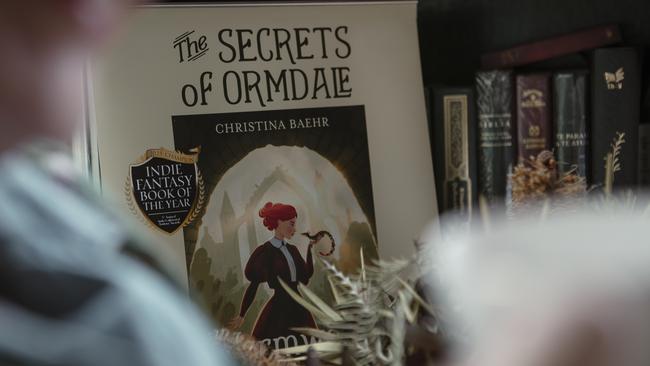
And once she’d begun to write, she’d begun to dream. Was there any chance she could make money by self-publishing? She shared manuscripts with writer friends who said the only way to find out was to try. “When I started writing I wasn’t thinking, ‘I’ll make money out of this’. It was just for joy – a creative outlet,” she says. “So I was like, ‘OK, well, I’ll just spend as little money as I can because I don’t want to take any food out of my kids’ mouths’.”
Many self-published authors don’t make a cent. But readers of “genre fiction”, which she had written, tend to act differently; they’re far less concerned about whether a book has a traditional publisher, and have built online communities in which they enthusiastically share recommendations. Christina didn’t even consider traditional publishing. “I was already reading indie books, so I felt comfortable reaching other indie readers,” she says. “I also had friends who were supporting themselves through self-publishing, so I knew they could help me – whereas getting an agent felt like a lot of work when I already had very little time.”
I wonder what her seven-year-old self would think of her now, in her early forties, writing books of her own. Christina can still remember her mother blinking back tears when, on her eighth birthday, she couldn’t decipher the words written in her cards. But she was a late bloomer – her reading eventually took off and she devoured everything from Jane Austen to P.G. Wodehouse to Anthony Trollope to Edith Nesbit and LM Montgomery (she fondly calls her husband Professor Baehr, after the character in Louisa May Alcott’s Little Women.)
She would embark on a career as a professional harpist who composed, recorded and performed nationally and abroad. A career highlight was being invited to play to a room of novelists, poets and historians at the Australian Embassy in Paris while in France for a music festival in 2006. The following year, she played and sang for celebrities including Andy García and Jennifer Lawrence during awards week in LA. (She says there’s still a place in her heart for Hornblower star Ioan Gruffudd. “He actually stopped talking to all the people at his table, stopped listening to them, and listened to me play instead,” she recalls, laughing).
After she married Peirce at the end of 2007 and became a mother for the first time in January 2009, she went from performing in concert halls and at Hollywood parties to a new role as mother. Once the children reached school age, she also became their teacher. “I was homeschooled and I absolutely loved it, it gave me a tonne of freedom for creative pursuits, and that’s why I was able to be a professional musician in my twenties,” she says. “So I was always super-keen on it. Peirce went to every form of school from daycare to a Masters program at university, so he was not anti-traditional schooling at all, but the more we talked about it, we got really excited about doing education together, exploring all these subjects that we’re passionate about and supporting our kids to pursue their gifts. We have quite a bit of neurodivergence in our family as well, so it’s great for them to have the freedom of homeschooling.”
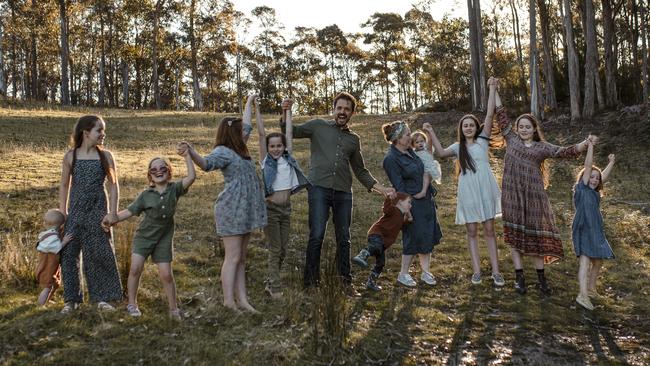
In an era of “helicopter parenting”, where children are rarely out of sight of their parents and ferried between school, sport and social events, Christina says she and Peirce take a less intense approach to parenthood, ultimately guided by their belief in God. “I don’t have to micro-manage my children because they’re human beings made in God’s image, just like me, and they’re going to make their own choices and mistakes – but ultimately I trust that the universe is actually telling a good story, because it’s in the hands of someone who loves it.”
The couple founded Pilgrim Hill, which caters for travellers to the valley (believers and non-believers alike) and, in the fruit-picking season, hosts regular dinners. The hostel is solar-powered, guests use composting toilets, and rainwater is captured and stored in tanks. They have communal dinners with guests three times a week, followed by a discussion “from a Christian point of view”.
As they put it on the Pilgrim Hill website: “You’re welcome to join us for good food and thoughtful discussions, whatever your background. You don’t have to be a Christian to join. We are open about our faith in Jesus Christ. It shapes the way we live. You may want to ask questions about this while you are here, and we are happy to answer, even if your questions are difficult. You’re welcome here.”
When Christina hit publish on October 6, 2023 on e-bookplatforms Amazon and Kobo, “it was quite amazing how quickly things started happening”, she recalls. She also paid a small fee to a distributor to assist her with publishing on other assorted platforms. Part of her strategy was to apply for a “featured deal” on the hugely popular US book discovery service BookBub.com – she got it – and the first book in the Ormdale series was offered as a free download to the site’s 15 million members. It was a huge coup; the site rarely features self-published authors, and in one 24-hour period Wormwood Abbey was downloaded 25,000 times. “Some people, they download a free book and they never look at it, but a lot of people were reading it and reviewing it on Amazon and telling people,” Christina says. In the month that followed, she made $13,000 as happy readers who’d downloaded her first book for free went on to buy the next books in the Ormdale series.
At first, she worried that her books were so particular, so focused on her own niche interests – they contained history-nerd jokes, even home-schooling-mum jokes – that readers wouldn’t enjoy them. But with each book, word spread and sales climbed. Today, Wormwood Abbey has more than 1400 reviews on Amazon, 60 per cent of which give it a 5-star rating. In the reviews for Drake Hall, that figure is 68 per cent. She says Instagram and its community of “Bookstagrammers” who review and promote new authors have also fuelled sales.
It was when a request for translation rights was made in December 2024 by a top Hungarian publisher that Christina realised she would need the help of a literary agent. “I cold-emailed someone in London, and was like, ‘Hey, look, help! These books are selling a lot. Do you think maybe people would want to translate them?’ And it was very funny because I now realise that people spend years trying to get a literary agent.” She received a reply within hours. “When [the agent] wrote back to me originally, after my cold email, she said, ‘Can we do a Zoom call?’ I was nervous on the Zoom call, because I was just like, ‘Oh, this agent is so experienced, look at all these clients she has, I’m going to have to impress her’. And it was so funny, because as soon as I got on the call I realised I’d completely misunderstood. In fact, she was pitching herself to me,” Baehr says, laughing.
Her agent, London-based Lorella Belli, has since met with literary scouts and publishers from all over the world, securing at least one deal for translation rights.
Stories about writers often fall into one of two categories: brilliant artists who can’t pay the bills, and those who make it big, says Christina. “There is another category, which is people like me who may have been struggling to pay for groceries, but they’re able to write a book that brings people joy. And enough people buy it and tell other people about it that I can now buy groceries... That does happen. We just don’t hear about it very much.”
Now she’s working on a new trilogy, The Gilded Age of Dragons, which is set in the same fictional world she created with Wormwood but takes place ten years later. It has “a Little Women meets Jules Verne feel,” she says. It follows three sisters finding their place in a world where airships and dragons co-exist. “I’m also developing what I call ‘philosophical romances’, which will be set in a clock-punk version of 17th-century Europe,” she says; they’re inspired by the metaphysical poets and early Enlightenment philosophers like Descartes and Pascal. “They will be full of poetry, revolution, and science.”
Christina Baehr is not famous, and she’s not rich, but in her first year of publishing she doubled her household income.
“I don’t need to sell millions of copies; I celebrate every milestone,” she says. The books are now available as e-books, paperbacks and audiobooks. She says she celebrated the first time she made enough from book sales to take her husband out for lunch, and again at the point at which the money paid for a new computer (writing the first three books on her phone “killed” the touchscreen). She doesn’t experience anything approaching writer’s block.
“For me it’s like the opposite – I want to write but I can’t because I have 10 kids and a lot is going on.”

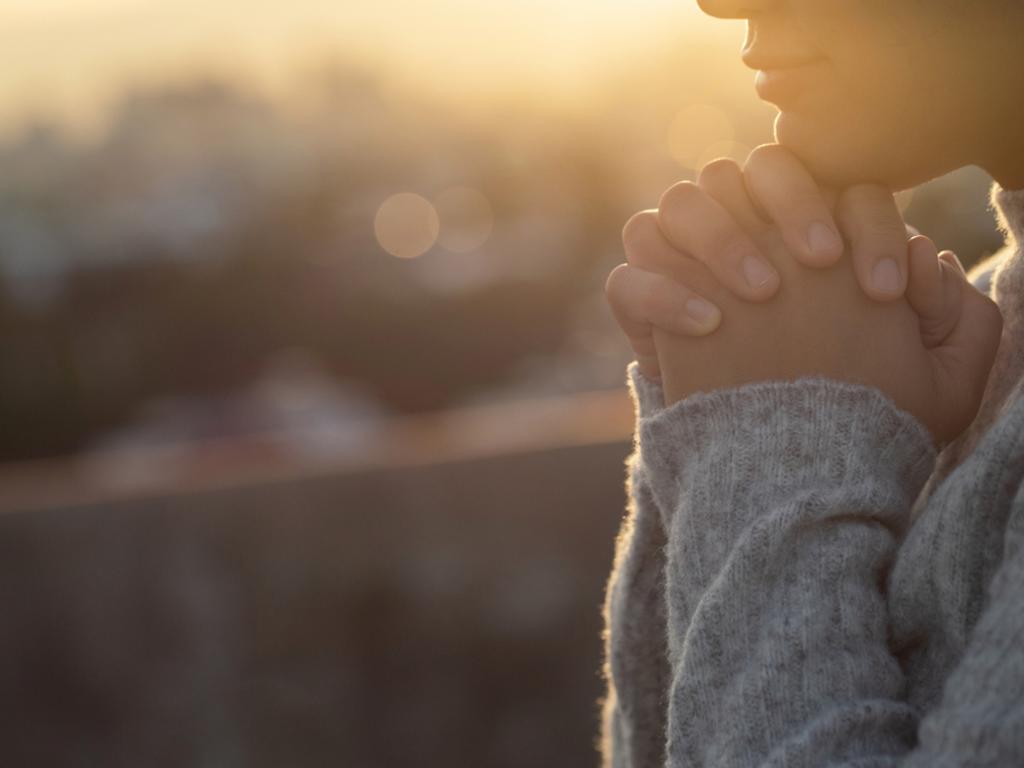

To join the conversation, please log in. Don't have an account? Register
Join the conversation, you are commenting as Logout